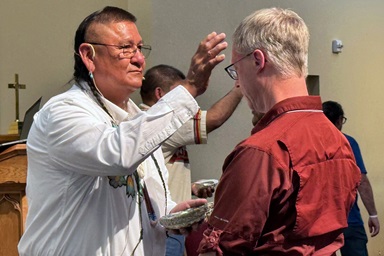The response of The United Methodist Church to the hostilities in the Middle East was characterized as “very weak and timid” during the joint meeting of the boards of United Methodist Global Ministries and Higher Education and Ministry.
“Our hearts are broken by the suffering that has occurred in Israel and Palestine since October,” said Roland Fernandes, top executive at Global Ministries and the United Methodist Committee on Relief. “As we look closely at what is happening in Gaza, in particular, the term ‘genocide’ should be a descriptor we are using.
“Church responses, especially the UMC, have been very weak and timid. We encourage all those in positions of authority to establish an immediate ceasefire so that those who are starving can be fed. As a Christian humanitarian organization, we ask that humanitarian organizations have full, immediate and safe access to Gaza.”
In an interview after the meetings ended, Fernandes said he “felt that something stronger needed to be said” about the continuing suffering.
“I’m in touch with our missionary on the ground there,” he said. “There’s just so many people without food and starvation. It’s just quite incredible, and I don’t think the story is told clearly enough.
“I just thought it was important to just lift it up.”
On March 13, the United Methodist Council of Bishops issued a statement that said the current military strategy in Gaza by Israel and supported by the U.S. “will lead to the destruction of the entire Gaza Strip, an unconscionable death toll that grows daily, the perpetuation of one of the world’s longest conflicts and the proliferation of increased enmity between Israelis and Palestinians, which has historically led to an increase in the militarization on both sides.
“There is no peace to be found in this strategy,” the bishops said in the statement.
Instead, the council called for “diplomatic initiatives that will engage both Israelis and Palestinians in an effort to understand the fears, hopes and aspirations of each other. Such strategies should actively seek a way to promote a just and lasting peace and cooperation that will lead to a two-state solution … an end to the current occupation and violence and the creation of a viable Palestinian state living side by side in peace with Israel.”
Return to main story Boards push forward despite budget cuts.



